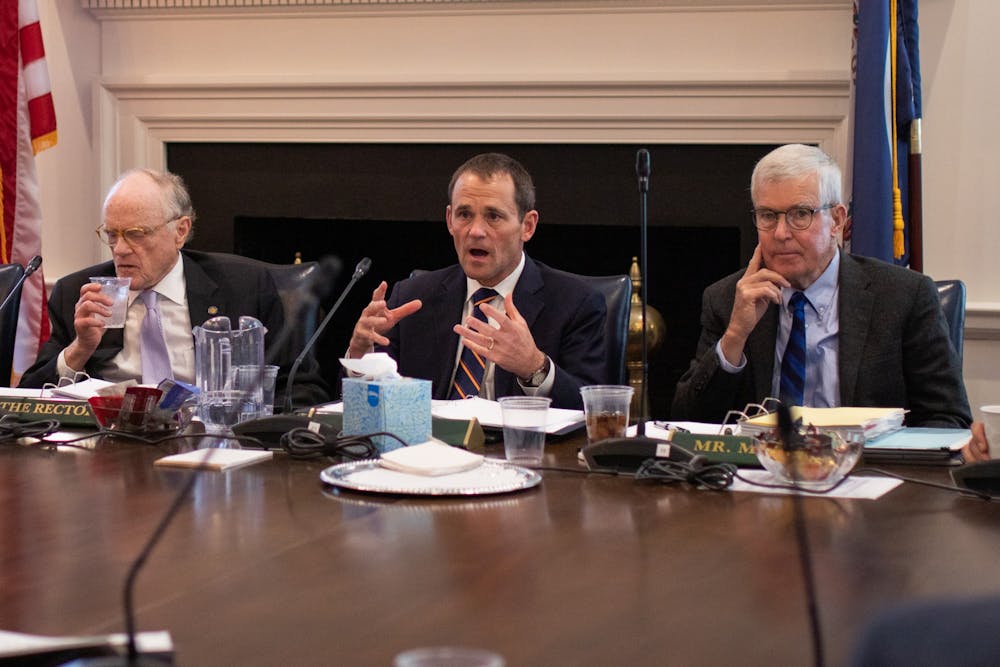The University’s Board of Visitors held its final session of the semester Friday afternoon in the Rotunda to discuss the aftermath of Nov. 13, mounting concerns of a global economic recession and procedural changes. Members heard remarks from University President Jim Ryan, Lily Roberts, student member of the Board and fourth-year Architecture student, and Faculty Senate Chair Patricia Jennings.
Ryan began his remarks by detailing the University’s response to the deadly shooting on Nov. 13, when second-year College student Devin Chandler, third-year College student Lavel Davis Jr. and fourth-year College student D’Sean Perry were shot fatally while returning from a field trip to Washington, D.C. All three were members of the Virginia football team. Two additional students, third-year College student Mike Hollins and second-year College student Marlee Morgan, were injured in the shooting and were later discharged from U.Va. Health.
Ryan highlighted the efforts made by students, faculty and the wider Charlottesville community to support one another, honor the lives of the deceased and provide aid for victims and their families. Students, faculty, administrators, community members and families attended a memorial service Nov. 19 to honor the three victims and the two students injured in the shooting. Organizations such as Madison House also compiled lists of psychological support resources for students, while other CIOs and student-run organizations hosted events and provided food.
Ryan also emphasized the record-breaking attendance at the annual Fourth-Year 5k and a Charlottesville elementary school’s bake sale in support of the victims and their families.
“As hard as these three weeks have been and as sad as they have been, our community pulled together in ways that I have never seen before,” Ryan said. “As I've said before, and will say again, I don't know that this place has ever felt more like family.”
Roberts used her experience as a student to inform Board members of the emotions felt by the students during the shooting. Because all the individuals shot were Black athletes, Roberts highlighted student athletes and Black students as among those disproportionately impacted. Roberts also acknowledged that students locked down on Arts Grounds were directly affected as the shooting took place in the area.
Roberts said the Board should not revert to the status quo, but rather move forward in a way that honors the victims’ memories.
“The concept of ‘returning to normal’ is concerning to myself and many of my peers … because there's a concern that we may go on without recognition of this tragedy and how it has fundamentally changed our Grounds,” Roberts said. “We might cease to attempt to look for normalcy by instead considering the imaginative and empathetic ways that we have already started to commemorate the lives of Devin, Lavel and D’Sean.”
The Board also considered ways to brace for a possible economic recession following the pandemic’s effects on industry and employment, citing the University’s robust medical campus as a reliable source of income in an unstable post-pandemic economy. Suggestions included focusing on graduate school enrollment and prioritizing the School of Nursing and School of Education and Human Development programs, which Board members predicted would be in demand if a recession occurs.
Jennings explained the recent reform to the Faculty Senate’s faculty representative election procedures, which will now operate with a ranked choice model and allow for nominations of any faculty member eligible to sit on the Faculty Senate. The reform comes after extensive debate among senators.
While other Board members are appointed by the governor, the Senate is permitted to elect one non-voting representative to sit on the Board. The change in representation was proposed after the Board told the Senate that it would not allow any senatorial representation if the Senate did not offer multiple candidate options for their consideration — giving the Board more control over the Senate’s already limited role in the Board representative selection process.
In October, the University’s chapter of the American Association of University Professors submitted a letter urging the Senate to compromise with the Board on its request to change the way the faculty representative to the Board is selected. The Senate ultimately voted to approve the amendment earlier this month, with 56 votes in favor, 19 against and two abstentions.
The next Board meetings will be held in March.







